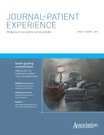Children's Mercy Kansas City Embraces
Patient- and Family-Centered Care
|
 When patients, families, and visitors enter Children's Mercy Kansas City—two state-of the-art hospitals in downtown Kansas City, Missouri, and suburban Overland Park, Kansas—they are greeted with a sign that says, “The children of Missouri and Kansas welcome you to their hospital.” This simple sign describes the patient- and family-centered environment at the hospitals and outpatient clinics. As CEO Dr. Rand O’Donnell says, “The children are our bosses!” The patients and their families are at the heart of everything that happens at Children’s Mercy in Kansas City. When patients, families, and visitors enter Children's Mercy Kansas City—two state-of the-art hospitals in downtown Kansas City, Missouri, and suburban Overland Park, Kansas—they are greeted with a sign that says, “The children of Missouri and Kansas welcome you to their hospital.” This simple sign describes the patient- and family-centered environment at the hospitals and outpatient clinics. As CEO Dr. Rand O’Donnell says, “The children are our bosses!” The patients and their families are at the heart of everything that happens at Children’s Mercy in Kansas City.
In 1999, Children’s Mercy established the first of its Patient and Family Advisory Boards. Hospital leadership recognized the value of collaborating with patients and families on an institution-wide basis after realizing, over time, the value of involving them—on an ad hoc basis—on various committees and projects. The creation of these boards facilitated a formal process for ongoing partnership among patients, families, and hospital leadership and staff. Currently, some Boards meet monthly, and provide an opportunity for families and staff to collaborate in efforts to improve the care experience.
In 2008, the hospital hired two parents as Family-Centered Care (FCC) Coordinators to represent the voice of patients and families throughout the hospitals and clinics. Coordinators share information with appropriate staff and hospital committee members about issues raised by patients and families, identify opportunities to increase engagement, create educational tools, and educate staff. Since 2008, family advisors have been involved in 138 committees and projects hospital-wide. Read more…. |
IPFCC’s Cambridge Seminar A Great Success!
|
|

A special thanks to Brigham and Women’s Hospital for its leadership support in bringing the Moving Forward with Patient- and Family-Centered Care: Partnerships for Quality and Safety ~ An Intensive Training Seminar, to Cambridge, Massachusetts on November 3-6.
We also want to thank our extraordinary faculty members and participants. Interdisciplinary teams from over 100 organizations enjoyed plenary presentations, panel discussions, and interactive breakout sessions. Teams developed practical action plans for change in the daily faculty-led small group meetings and we look forward to hearing about progress. Of course it was not all work at the seminar—we traveled to Fenway Park for a memorable celebratory dinner.

2014 © lightchaser photography
A patient and family panel is always a highlight of the first day of the seminar.
Read what participants had to say:
“I was immediately and consistently reminded of why I chose this profession. Thank you on behalf of myself, my family, and all of the lives I will more positively impact beginning tomorrow.”
"This was an unforgettable and career-changing experience. I truly feel like I can make a difference with the tools and education you have provided me!”
Watch for news about our upcoming Spring 2015 Seminar.
|
Advancing Compassionate, Patient- and Family-Centered Care |
|

The Schwartz Center for Compassionate Healthcare, The Arnold P. Gold Foundation, and its academic partner, The Bucksbaum Institute for Clinical Excellence, with support from the Josiah Macy Jr. Foundation, held an invitational conference in Atlanta, GA from October 30 to November 1, 2014.
The conference was part of the Schwartz Center’s National Consensus Project on Compassionate Healthcare. Its goal is to ensure that compassionate care is a fundamental element in the design of health care systems, the provision of care, the measurement of health care quality and outcomes, and the education of all health care professionals. The planning committee included IPFCC Board member Liz Crocker. IPFCC faculty member Juliette Schlucter, Director, Center for Child and Family Experience, Sala Institute for Child and Family Centered Care, NYU Langone Medical Center, presented her personal story of being the parent of children with special health care needs during the conference.
A pre-conference request for abstracts identified eleven exemplary educational initiatives and models fostering compassionate care. Deborah Dokken, IPFCC consultant, together with Greg Adams from Arkansas Children’s Hospital, presented on the Initiative for Pediatric Palliative Care (IPPC) and its model of “relational learning across boundaries.” Both Deborah and Greg led IPPC's innovative model—a multi-site national project spearheaded by the Education Development Center in Newton, MA—that was used from 1998 through 2010 to educate more than 2,000 clinicians and 300 family members about the needs of children with life-threatening conditions and their families.
The invitational conference to advance Compassionate, Patient- and Family-Centered Care Through Interprofessional Education (IPE) For Collaborative Practice involved 85 attendees, including health care providers, educators, researchers, and patients and family members to ”build on current initiatives to advance interprofessional education for compassionate and collaborative, patient-centered care.” Participants identified “models and opportunities, as well as barriers … to ensure that the values, knowledge, and behaviors needed to provide such care are taught, demonstrated, supported, and sustained within and across clinical settings.” Post conference resources, including a report on lessons learned and recommendations, will be developed. The intent is for clinicians, educators, accreditors and others to "learn about relevant competencies and ongoing efforts to implement IPE for compassionate and collaborative care.”
Partnering with Patients and Families as One of Seven Guiding Commitments in Providing Compassionate Care
 On a related note, an interesting article in the Journal of Patient Experience, Seven Guiding Commitments: Making the US Healthcare System More Compassionate, authored by Beth Lown, MD, Medical Director of the Schwartz Center for Compassionate Healthcare describes and discusses the seven recommendations that “emerged from a working meeting of the Schwartz Center’s National Consensus Project on Compassionate Healthcare that are intended to “foster a more compassionate health care system.” On a related note, an interesting article in the Journal of Patient Experience, Seven Guiding Commitments: Making the US Healthcare System More Compassionate, authored by Beth Lown, MD, Medical Director of the Schwartz Center for Compassionate Healthcare describes and discusses the seven recommendations that “emerged from a working meeting of the Schwartz Center’s National Consensus Project on Compassionate Healthcare that are intended to “foster a more compassionate health care system.”
One of the seven commitments is “to partner with patients and families” with a goal that “healthcare organizations and systems invite patients and families to participate in and co-create processes and policies that promote compassionate care.” Recommendations include organizational and clinical leaders inviting patients and families to design care process, and to “participate in governance, councils, and committees that develop organizational policies and help to advance compassionate, patient- and family-centered organizational cultures.”
Learn more about how this and the other commitments can be implemented.
|
Better Together: Partnering With Families Across the Continuum of Care
|

Beverley H. Johnson, President and CEO, IPFCC, shares her Viewpoint: Better Together: Partnering With Families Across the Continuum of Care in the latest issue of the Association of American Medical Colleges (AAMC) Reporter, October 2014.
In this article, Bev talks about IPFCC's Better Together Campaign to educate hospitals about the need to change restrictive visiting policies so that family members are no longer viewed as visitors in a patient's life. She notes the importance of ch anging restrictive and outdated "visiting policies" of hospitals to "those that welcome and support family presence and participation in care and decision-making" arguing that families and other designated care partners "can become allies for quality and safety." anging restrictive and outdated "visiting policies" of hospitals to "those that welcome and support family presence and participation in care and decision-making" arguing that families and other designated care partners "can become allies for quality and safety."
The article addresses the important role that medical schools and academic medical centers can play in this transformation, by creating "the vision and expectation that their institutions will welcome and respect families" as defined by the patient "as important members of the health care team 24 hours a day, seven days a week."
Medical students and other trainees must be taught how to work effectively with families and other care partners, and how to address privacy and other concerns. They need to observe faculty "partnering respectfully with patients and families" while participating in daily and interdisciplinary rounds. To improve medical education, and in turn patient care, institutions must embed the core concepts of patient- and family-centered care in all aspects of their training.
|
National Partnership for
Women & Families Joins with IPFCC in the Better Together:
Partnering with Families Campaign |
|
 As the last article in a series about IPFCC partners in the Better Together: Partnering with Families Campaign, IPFCC welcomes the National Partnership for Women & Families. The Better Together: Partnering with Families Campaign calls on all hospitals to eliminate restrictive visiting policies and welcome families 24 hours a day. IPFCC has set a campaign goal that 1,000 hospitals will change their visiting policies by 2017. As the last article in a series about IPFCC partners in the Better Together: Partnering with Families Campaign, IPFCC welcomes the National Partnership for Women & Families. The Better Together: Partnering with Families Campaign calls on all hospitals to eliminate restrictive visiting policies and welcome families 24 hours a day. IPFCC has set a campaign goal that 1,000 hospitals will change their visiting policies by 2017.
The National Partnership for Women & Families (National Partnership) is a non-profit, non-partisan advocacy group dedicated to promoting fairness in the workplace, reproductive health and rights, access to quality and affordable health care, and policies that help women and men meet the dual demands of work and family. The National Partnership was founded in 1971, as the Women's Legal Defense Fund.
The National Partnership's Campaign for Better Care advocates "that partnerships between patients and their health care providers must be at the center of a transformed health care system...Patients and families have unique insights into their health and the health of their loved ones, and they need to be a part of the teams and the decision-making processes that affect their care."
Thanks to all the Better Together partners, including American Society for Healthcare Risk Management, American Association of Critical-Care Nurses, Canadian Foundation for Healthcare Improvement, New Yorkers for Patient and Family Empowerment, Health In Aging Foundation, and the National Partnership for Women & Families.
|
    

    
|
|
In This Issue |
|
- Children's Mercy Kansas City Embraces Patient- and Family-Centered Care
- IPFCC’s Massachusetts Seminar A Great Success!
- Advancing Compassionate, Patient- and Family-Centered Care
- Better Together: Partnering With Families Across the Continuum of Care
- National Partnership for Women & Families Joins with IPFCC in the Better Together: Partnering with Families Campaign
- IPFCC Announces Two More December Webinars
- Military Family Empowerment: Guidelines for Creating, Implementing, and Evaluating Mind-Body Programs in a Military Health Care Setting
- Thanks to our 2014 PFAC Network Sponsors ~ Would Your Organization Like to Sponsor IPFCC’s PFAC Network for 2015?
- Survey To Collect Information on PFACs
|
IPFCC Spring Seminar Going to Memphis!
Details Coming Soon
**************
|
IPFCC Announces Two More December Webinars
|
IPFCC is offering two more exciting Webinars in December:
Involving Physicians in Patient- and Family-Centered Initiatives—Applying Principles to Practice; Tuesday, December 16, 2014.
Join Bill Schwab, MD, Professor and Vice Chair of the Department of Family Medicine at the University of Wisconsin School of Medicine and Public Health.
Responding to Medical Errors in a Patient- and Family-Centered Care Environment; Wednesday, December 17, 2014.
Join Maureen Connor, RN, MPH, Healthcare Consultant and former VP for Quality and Risk Management at the Dana-Farber Cancer Institute, and Leilani Schweitzer, mother and TED presenter.
These webinars are a cost-effective educational resource. The cost is per line, and a group of any size may participate in the same room on one line. Handouts and supplemental resources are included with registration. Learn more about faculty, learning objectives, and Pinwheel Sponsor discounts.
|
Military
Family Empowerment: Guidelines for Creating, Implementing, and
Evaluating Mind-Body Programs in a Military Health Care Setting
|
|

The Samueli Institute developed and field tested a set of tools called the Guidelines for Creating, Implementing, and Evaluating Mind-Body Programs in a Military Health Care Setting. These are intended for use by military health care facilities to help members of the military and their families cope with stress, improve health, and thrive, using mind-body skills to manage stress.
The “family empowerment approach” described in the Guidelines, enables members of the military and their families to:
- Actively participate in their medical care and symptom management;
- Be responsible for and participate in their health and healing process;
- Instill them with a sense of control over their recovery;
and
- Increase the efficiency of the military health care system.
To develop the framework for the Guidelines, Samueli convened a multidisciplinary panel consisting of experts in military and Veterans Administration (VA) culture, conventional health care clinicians, mind-body practitioners, program development and evaluation experts, and patient- and family-centered care leaders (including IPFCC’s Joanna Kaufman). Subject matter experts reviewed the draft guideline framework, and provided comments for improvement for use by the staff of the Samueli Institute. Learn more….
|
Thanks to our 2014 PFAC Network Sponsors ~ Would Your Organization Like to Sponsor IPFCC’s PFAC Network for 2015? |
 IPFCC is seeking funding/sponsorship for the PFAC Network for 2015. Currently the listserv has 1071 members! Organizational sponsors receive recognition and all the associated benefits of IPFCC Pinwheel Sponsorship as well as your organizational logo on the PFAC Network home page. If you are interested in being the champion of this PFAC Network, please contact Ann Selinger. IPFCC is seeking funding/sponsorship for the PFAC Network for 2015. Currently the listserv has 1071 members! Organizational sponsors receive recognition and all the associated benefits of IPFCC Pinwheel Sponsorship as well as your organizational logo on the PFAC Network home page. If you are interested in being the champion of this PFAC Network, please contact Ann Selinger.
A special thank you to the 2014 PFAC Network Supporters:
The Children's Hospital of Philadelphia and Boston Children's Hospital.
|
Survey To Collect Information on PFACs |
The Institute of Medicine (IOM), with the support of the Gordon and Betty Moore Foundation, and a consortium of stakeholders is launching a web-based survey to collect details about how individual hospital PFACs function, including specific activities embarked upon and metrics used to measure success.
Each participating hospital/health system is asked to provide contact information for a total of two PFAC volunteers (a leader and a member) and one staff member who works closely with patient and family advisors.
For more information, please contact Diedtra Henderson. |
Links
|
|
|
Previous Issues
|
|
|
About Us
|
Founded in 1992 as a nonprofit organization, the Institute for Patient- and Family-Centered Care works to advance the understanding and practice of patient- and family-centered care in all settings where individuals and families receive health care.
|
|
